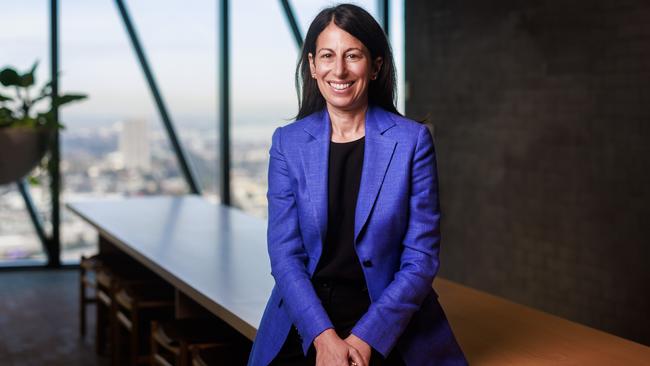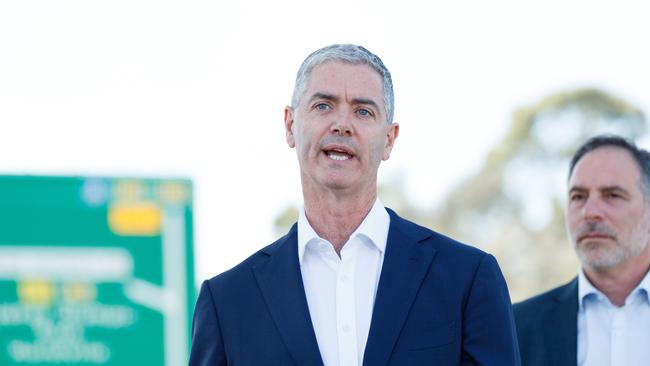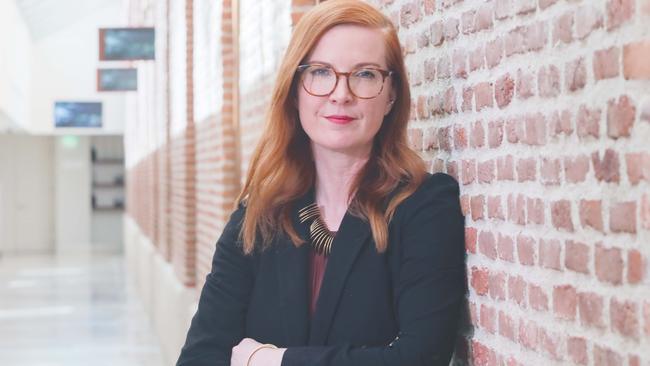
The first was former Victorian transport minister Peter Bachelor who more than 20 years ago, for all of $10m, agreed to change the company charter from a CityLink-specific company to being able to own other assets.
It now owns toll roads internationally, a virtual monopoly up the east coast and, according to NSW Treasury figures, under present contracts it will collect $195bn up to 2060 from its monopoly ring of NSW toll roads.
In Melbourne it has another 10 years on its landmark CityLink concession, under which it will collect above-CPI toll increases until 2045 under the terms of its deal to help build the West Gate tunnel. That has helped power 78 per cent earnings margins.
In the next couple of weeks the NSW government will unveil a broad heads of agreement with the owners of its toll roads to start negotiations over tolling arrangements.
Transurban boss Michelle Jablko is smart and has made clear she is ready to talk, opening the door for potential changes.

The former ANZ CFO and investment banker understands the level of noise surrounding the company, risks to its operating licence, and knows she needs to be seen to be helpful to rid herself of the political football tag.
While happy to talk, that does not mean Jablko will agree to a cut in cash flow.
Happily, there are not a lot of new roads in NSW to be built, which means there is not a huge payback if she draws a tough line in the sand, but international expansion is now the only real growth option.
Like a good banker, she is also doing the right things to help sell the benefits of her roads, offering loyalty rewards, explaining value by telling customers how much time they have saved on her roads, better signage and working with Google et al showing alternate routes to save tolls.
The regulatory risk has dialled up with, on the recommendation of Alan Fels’ and David Cousins’ government report, the creation of a new specific toll roads body, NSW Motorways, regular IPART reviews to increase transparency, and the creation of a new ombudsman and customer advocate.
Transurban would love the government to play the role of its debt collector, but that’s a big call and just one of many potential moves next year, including two-way tolls on the Harbour Bridge.
The next step will be completion by Treasury representatives, RBC’s Antony Steinberg and the team at Baker McKenzie, who are wrapping up the heads of agreement to signal the ground rules for next year’s lengthy debate on the new tolling deal.
Politicians epitomised by former NSW premier Mike Baird have long treated infrastructure as bragging rights and a short-term cash cow, with little thought for the long-term consumer costs and competitor dynamics, but just maybe a new line may emerge.
Mapping AI benefits
AI, according to Professor Kate Crawford, is neither artificial nor intelligent and is instead a highly extractive industry much like BHP and Rio Tinto are in mining.
The New York-based Australian has studied the revolution for two decades from the perspective of a social scientist rather than one of engineering nerds writing code for the industry.
The explosion of generative AI in the past few years has vaulted the industry to a point of inflection at which we should all be asking the question whether what is happening is worth the costs.

In an address at the State Library of Victoria in Melbourne this week, Crawford posed a challenge for her hosts, with libraries’ very mission of being open access to knowledge under threat, not to mention the media and creative industries, whose existence is being undermined.
Titled “Mapping Planetary AI”, it built from her MoMA installation, which lays out the extraction of knowledge and resources by the industry and built by often underpaid workers.
Chatbot inventor in 1966 of Eliza for Amazon, MIT professor Joseph Weizenbaum wanted to explore communication between humans and machines and managed to fool people that the machine is actually thinking when it is merely copying what has already been said.
Crawford told The Weekend Australian that “AI pulls data from across the internet, library databases and our online presence, (and) it generates a significant change in our relationship with knowledge”.
“But what do we really know about this pervasive technology? Do our societies have robust guardrails in place to protect people and democracies? And have we reckoned with AI’s environmental impact?”
She said “it’s too early to tell”, which may be right but not necessarily helpful.
But the University of Southern California professor and senior principal researcher at the Microsoft Research Centre is certainly right to raise the issues.
One of her concerns is how concentrated the sector is, with China and three US cloud-based companies – Amazon, Microsoft and Alphabet (Google) – controlling the industry.
She defends her work for Microsoft saying it is good that people inside the tent are publishing research to inform debate.
Crawford is also an accomplished artist with works in the permanent collections of the New York Museum of Modern Art (MoMA), the Victoria and Albert Museum, and the Design Museum in London.
The MoMA installation traces a chatbot in the room back to its mineral beginning, to the garbage dump when it is thrown away three years later.
Some like Israeli professor Yuval Noah Harari in his book Nexus trace the history of information networks and worry that AI has unleashed computers that can think for themselves without human input.
Crawford fears the machine is turning humans into robots and at the very least companies like Amazon find it a lot easier to employ robots than humans: they have no emotions and no unions.
Her view is more to ask how many new ideas have actually come from a chatbot.
The environmental impact is clear, with Goldman Sachs predicting $US1 trillion will be spent on the industry in the new few years on everything from silicon to training AI models to data centres, and power and water to supply electricity and cool the centres.
The new energy required matches that used in Japan, which isn’t helpful to the planet, but industry backers say don’t worry, AI will solve the problem.
The question is when and whether it will all be worth it.
Crawford’s talk was part of a series funded by the library’s Women Writers Fund, which was co-founded by Krystyna Campbell-Pretty and Helen Sykes and endowed by the Helen Macpherson Smith Trust.
Jones talks regulation
If you worry about too much new regulation don’t worry with digital platforms because Assistant Treasurer Stephen Jones is on the job.
This week he said the government would introduce new digital platform controls, which is what his boss Jim Chalmers said 12 months ago when he referred the issue to Jones for more consultation, and what the ACCC asked for in September 2022, when it sought the new ex-ante powers.
There is more consultation with comments due by February 14, then draft amendments will be framed subject to more consultation and of course there is a federal election tipped for next May.
Chances of change in 2025 are slim: lucky because, as noted by the ACCC in its response, the worry is that Australian businesses and consumers are left behind.
New commissioner
Industry Minister Ed Husic is finally expected to name a new anti-dumping commissioner shortly. This comes 12 months after the Bradley Armstrong retired.




Transurban’s first boss, the late Kim Edwards, once said, “when you have your foot on their throat don’t move it”, and state politicians have obliged ever since, until John Graham took the reins as NSW Roads Minister (he also serves as minister for music and the night time economy).